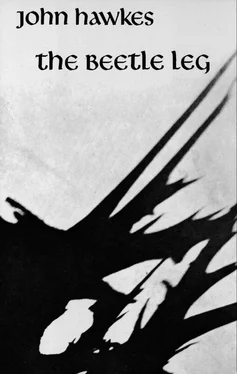John Hawkes - The Beetle Leg
Здесь есть возможность читать онлайн «John Hawkes - The Beetle Leg» весь текст электронной книги совершенно бесплатно (целиком полную версию без сокращений). В некоторых случаях можно слушать аудио, скачать через торрент в формате fb2 и присутствует краткое содержание. Год выпуска: 1951, ISBN: 1951, Издательство: New Directions, Жанр: Современная проза, на английском языке. Описание произведения, (предисловие) а так же отзывы посетителей доступны на портале библиотеки ЛибКат.
- Название:The Beetle Leg
- Автор:
- Издательство:New Directions
- Жанр:
- Год:1951
- ISBN:978-0811200622
- Рейтинг книги:4 / 5. Голосов: 1
-
Избранное:Добавить в избранное
- Отзывы:
-
Ваша оценка:
- 80
- 1
- 2
- 3
- 4
- 5
The Beetle Leg: краткое содержание, описание и аннотация
Предлагаем к чтению аннотацию, описание, краткое содержание или предисловие (зависит от того, что написал сам автор книги «The Beetle Leg»). Если вы не нашли необходимую информацию о книге — напишите в комментариях, мы постараемся отыскать её.
The Beetle Leg
Newsweek
The Beetle Leg
The Beetle Leg — читать онлайн бесплатно полную книгу (весь текст) целиком
Ниже представлен текст книги, разбитый по страницам. Система сохранения места последней прочитанной страницы, позволяет с удобством читать онлайн бесплатно книгу «The Beetle Leg», без необходимости каждый раз заново искать на чём Вы остановились. Поставьте закладку, и сможете в любой момент перейти на страницу, на которой закончили чтение.
Интервал:
Закладка:
“Come up here,” peering from the wagon as through the lifted slats of a pawnshop, and the Indian’s dusty hand crept to her shoe. “Here,” he repeated, pointing at a spot on the soapy planks between his feet. His eyes blinked as if in a moment’s pause he had been defied by a dog which, turned on its back in the shade, shook loose paws over a row of ugly dugs exposed like buttons. Cap Leech merely twisted about and began, knees rustling, to prepare.
He himself had never been hospitalized except in his own wagon and under his own wandering eye. No one had ever, behind a film-like screen, looked at the hairlined features of a body fixed without back or front after the last rheumatic seizure, nor watched, prying at the insides of a virgin relic, the passage of a bismuth cud down ducts that were peculiarly looped and unlike the intestines of either bird or man. It was his pleasure never to bathe at the side of the road.
He had reduced all medicine to a ringed wash basin and kept, for its good or harm, the tinkling world in a bundle under his rocking bed. In the stove he burned powders to kill disease; he lived in useless fumigation. He bled strangers in a room they could not stand in or laid them on his own iodoform dampened quilt. Treatment was his secret and while breathing into a bearded face he remembered the startling slant of a physician’s eye through a hole in a steel reflector.
Once he had nearly died in the wagon, naked on a pile of clothing and an arm’s length from a bogus bottle of capsules lying on its side without cork or label. To die like a gypsy with a bit of pumice and mercury in a wicker basket — and the horse would have continued on the walk of its choice, craned its head for low apple branches across the road, dragged his body along the borders of unoccupied, lazy states. Not now, the horse stood still and Leech, despite one empty cavity in his abdomen, wiped his hands and with more vigor than ever mixed his scant tools with a hoot in the night.
Out came the tin can. The big eyes of the Indian lay on the sill, she sniffed the heady gas. “This is a xyster,” said Cap Leech climbing again to his feet. He had kindled wood with it. For a moment he turned it over, then facing her quickly, “xyster,” he repeated and dropped it, the clank of a museum piece, into the enamel pan. “No bone drill,” speaking clearly and with a faraway cut to his spectacles, “that’s gone.”
Back and forth went the can, its lid clapping with the niggardly puffs of a censer. Simultaneously, the Madan’s two hands rose a few inches from the arms of the chair, fat dark fingers spread into perfect, electrified starfish. And Cap Leech, with the sparsest gold in his teeth, slid along the wall, fixed the white sheet over the already bolted door.
There was a beginning, a middle, and finally a scrubbing down of the wagon. The mere steam of a croup kettle set him in mind to pay a visit and was enough to recall one by one his pictures of the great troop of the afflicted. He was a midnight vivisectionist in a cat hospital. When the kettle sang there was no stopping until the point was put to flesh. The little ribs clicked along the backs of his hands, he looked at them and then at the Indian who would sit for him until he ended on his knees with a pail and lick of sponge.
“That’s bad. That feculence buries itself in the root and then one night it comes out in the brain. Even the black salve won’t stop it.”
The beginning was nothing but a look into his pockets, a tug on the vest, a pacing now and then interrupted with a quick, open mouthed inspection. It was a moment of osmotic consideration when, from the vantage of his long walk across broken backs, he could again with serious brows glance down upon the undecided paths of youth. Even when he was only thinking of what he would do to her, before the old deftness came into his warty fingers, he was a man apart, not to be disturbed. So cheerfully preoccupied that when the wagon shook he merely steadied himself with a violinist’s precious hand. And when they shouted, “Come on out of there. We’re going to steal your horse,” he simply put his ear to the wood and nodded.
From the darkness Bohn challenged the wagon, his mastiff voice close upon the back steps. “Ho, Doc, we’re going to kill the Finn.”
But Leech was already to the middle of the one last operation. Slippers padding, pushing the pan near with his toe, he gripped the Indian’s face to his hip. Smashes of greasy hair rubbed the smoking vest. “Black salve … won’t help.”
Bad breath, his whole failing system came through his open teeth, second only to the ether. It was the odor of a lopsided, glistening face, the smell of air tasted in advance before it leaves the bloodstream. Closer, that taint of breath, always absorbing, draining, smelling of a dozen others, it clicked short then commenced again with spores and a squinting whistle. He breathed off the aroma of a poultice. The crook stayed in his arm until he was done.
Not once did the Indian with violet pudendum close her eyes. A shifting of the fat woman leg tops, a twitch of the jingling body and she was still, reaching upward mutely a dark spot on her forehead. The ether, tilted under her nose as if he would make her drink, slowed the rise and fall of the sweatered chest, brought no unconsciousness.
Leech staggered coldly with it himself, pulled her into a better light. The pitch of his bland probing, the ether jag height of diagnosis was upon him and he began, pressing the lip, to make out the selected crooked shell as with a red line.
Once more there was the squawk of wheels, a thudding against the wagon and Cap Leech’s hold was jarred. Sensing the cut of leather, the tramp of feet, he felt the shafts fall dead and knew that the wagon was no longer powered.
“Finn, can you climb up there alone?”
Only the far voice of falling animals, the inconsequential distraction of merry fleas. His mouth worked, he let the backs of his trousers fan to the stove a moment, bent down once more and with blank face looked into the Indian’s pulsing gullet. A few quick movements and he had passed over the crushed strawberries on her breasts.
The elbow remained contracted, unbreakable and hard, tensed as with some nerve disorder, hooked in the invisible sling. He felt no tiredness in that passive arm hypnotically closed on the Indian’s head. It waited while the lively fingers of the other hand fished as into the mouth of a bottle and massaged. Once, twice, he pushed at the tooth, curiously, a squatted child pushing his finger into the ribs of a drowsing dog. With mathematical patience he tried its give: nothing, deep through the jaw. Then he stopped, cocked his ear toward her, suspicious, listening.
Emanations. With hovering hand this time interrupted, Leech became aware of the trick. The Indian, in a last bodily defense, slightly bulged some muscles, loosed others, and secreted from licentious scent spots and awakened nodes, a sensation of difference marvelous as anything he had ever seen. The captive, still watching him with unchanged eyes, generated like an octopus the ink of desire. He could see not even a garter, there were no words, not a gesture, but he knew his momentary pause was measured against some beating in her inward temples. A thorough discoloration, a pointed glowing of hidden skin for the old man, and it led him a few steps away, among the moistened ferns. She was waiting to see if he would strike.
“Ride for a fall, Finn,” outside there came a four footed whispering from the bronc stockade, “they’s burrs in that saddle!”
Cap Leech heard it. But he began.
He carried a face with the jaws clamped at his breast and against the weak spot, a freakish indentation, of his missing rib. The tooth crumbled. No bigger than the eye of a bird frozen to a twig, it splintered, broke apart, as he gauged with the tip of the instrument, worked with a strong twisting of the wrist. Leech applied a woodcarver’s rhythm to the crown and neck of the belated thirty-second tine. Now and then the metal, in its circular and steady thrust, touched her lip or knocked against her other teeth.
Читать дальшеИнтервал:
Закладка:
Похожие книги на «The Beetle Leg»
Представляем Вашему вниманию похожие книги на «The Beetle Leg» списком для выбора. Мы отобрали схожую по названию и смыслу литературу в надежде предоставить читателям больше вариантов отыскать новые, интересные, ещё непрочитанные произведения.
Обсуждение, отзывы о книге «The Beetle Leg» и просто собственные мнения читателей. Оставьте ваши комментарии, напишите, что Вы думаете о произведении, его смысле или главных героях. Укажите что конкретно понравилось, а что нет, и почему Вы так считаете.












